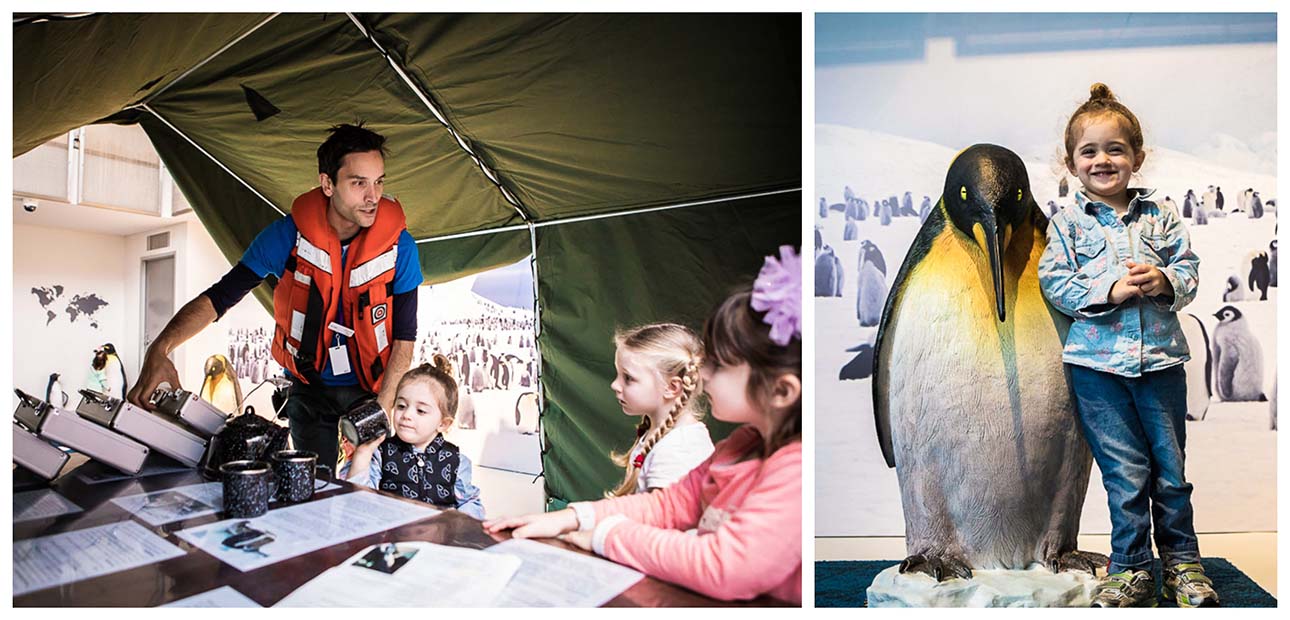July 6, 2018
Early Start launches Antarctic themed experience
‘Antarctica: Field Research’ inspired by UOW research expeditions
The University of Wollongong’s Early Start Discovery Space will launch an Antarctic-themed experience for young children at 10.30am today (Friday 6 July), just in time for the school holidays.
“Antarctica: Field Research” comes complete with penguins, whales, a research vessel and an explorers’ tent, and is a revamp of the experience previously known as The Dockyard.
As they play, children will learn about the different animals that live in and around Antarctica. They will also have the opportunity to engage in creative role-play, taking on the parts of researchers, scientists and crewmembers.
Antarctica: Field Research has been inspired by the experiences of UOW scientists on research expeditions to Antarctica, and also draws on aspects of Australian Indigenous culture.
Dr Anthony McKnight from UOW’s School of Education and PhD student Rachelle Balez from the School of Biological Sciences and the Illawarra Health and Medical Research Institute played key roles in guiding the design of the Antarctica exhibit and will speak at the launch.
Earlier this year Ms Balez travelled by ship to Antarctica as part of the Homeward Bound initiative, a leadership development program for women scientists. She has used her experiences on that expedition to inform Antarctica: Field Research, and hopes to inspire curiosity in children about the environmental challenges Antarctica faces.
“Children are the custodians of our planet, we are safekeeping it for their future, until they do the same for their children. If we can show children how to respect and love our plant, then it will be in safe hands for many generations,” Ms Balez said.
As well as informing children about Antarctica, the experience educates them about Australian Indigenous culture and its relationship with the environment.
Dr McKnight is an Awabakal, Gumaroi and Yuin Man, and his research focuses on the importance of Aboriginal Country in Aboriginal knowledge systems and processes.
“It is critical to educate children that the natural world exists in a reciprocal relationship with us, as opposed to just taking things away. Starting with small children and exposing them the respect demonstrated in Aboriginal culture is a great way to start this process of education and understanding,” Dr McKnight said.
“We have to give our culture away in order to keep it, because if we don’t share that knowledge how do we teach people to respect our culture and country? It’s important to educate children on this and provide them with the tools to better understand Indigenous culture.”
 Left: Early Start Discovery Space Experience Officer Nicholas Cervonaro with Emily, Eliza and Chloe in the explorer's tent. Right: Emily enjoys the Penguin display. Pictures: Mark Newsham
Left: Early Start Discovery Space Experience Officer Nicholas Cervonaro with Emily, Eliza and Chloe in the explorer's tent. Right: Emily enjoys the Penguin display. Pictures: Mark Newsham
Antarctica: Field Research draws on the resources of the Illawarra Indigenous community and researchers, Greenpeace, UOW and Early Start. While the experience is opening right in time for the start of the school holidays, the experience will be in place for the next 12 months.
To celebrate the new experience, July has been declared Antarctica month at the Discovery Space with special activities throughout the month including Compass Hunts, Ice Cube Rescues, Heat Vision, Microscopes, Snowstorm Music and Movement, and Getting Around Antarctica.
There will also be special guest visits from the Science Space, which will present a super cool show about liquid nitrogen, and from Rangers on the Run, who will bring an underwater touch tank to the space – both coinciding with the school holidays.
ABOUT EARLY START
Early Start empowers children, families and communities. The Early Start Discovery Space allows for direct interaction and engagement with children and families to inspire imagination and ignite a love of learning.
A partnership with a network of engagement and early childhood centres enables Early Start to make an impact through service providers, focussed on the local environment and issues.
Research allows Early Start to understand the key challenges and develop community interventions based on evidence and finally teaching and learning programs allow us to develop leadership
Main image: Early Start Discovery Space Experiences and Visitors Manager Martha Johnson with Alivia. Picture: Mark Newsham
:format(jpg)/prod01/channel_3/assets/live-migration/www/images/content/groups/public/web/media/documents/mm/uow249207.jpg)